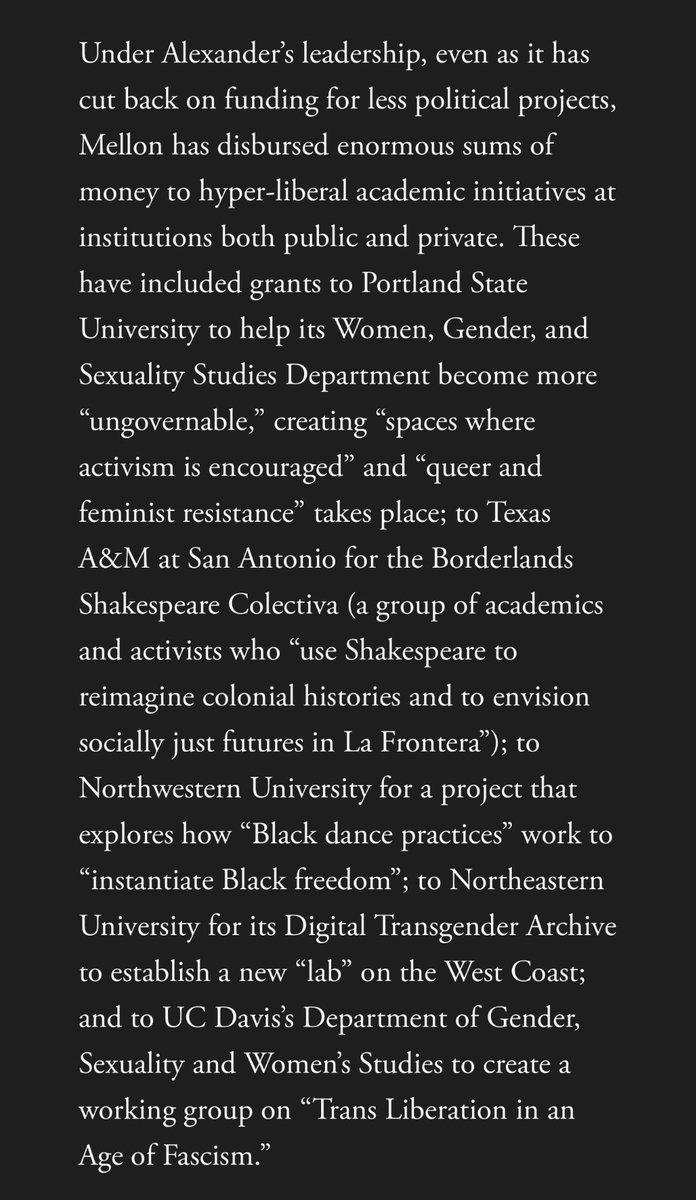
Staff writer @TheAtlantic. Co-host of @ttsgpod podcast. Gone fishing.
2 subscribers
How to get URL link on X (Twitter) App


https://twitter.com/TheAtlantic/status/2021928567651594655To put things into perspective: the National Endowment for the Humanities (NEH) had a grant budget of 78 million dollars in 2024. Mellon spent 540 million in grants that year. Mellon, a highly politicized private nonprofit, has a near total monopoly on humanities grant making. 2/

https://twitter.com/TheAtlantic/status/2015247053325005040
 I was born into a hunting family and raised by a combat vet who became a cop. I've been a gun owner since I was a kid. I was quite literally raised in the gun community: my very first job was at a PA gun club, where faith in the 2nd Amendment was instilled in me daily. 2/
I was born into a hunting family and raised by a combat vet who became a cop. I've been a gun owner since I was a kid. I was quite literally raised in the gun community: my very first job was at a PA gun club, where faith in the 2nd Amendment was instilled in me daily. 2/
https://twitter.com/theatlantic/status/1993805751463051432As its title implies, the show satirizes Will Stancil, the Twitter-famous liberal pundit. This year’s season premiere of The Simpsons had 1.1 million viewers. Just over a week later, the first episode of The Will Stancil Show debuted, accumulating 1.7 million views on Twitter. 2/
https://twitter.com/wanyeburkett/status/1931518860433187218The entire cultural and economic logic of Big Tech boils down to finding new ways to not simply disintermediate the human element, but to acculturate us to viewing human-to-human contact as inefficient at best, and something to actively recoil from in fear or disgust at worst.
https://twitter.com/samhaselby/status/1923784042031280589My big concern coming out of the Biden fiasco is that left-liberals have STILL not learned that self-criticism is healthy: a lot of folks are saying “let’s not dwell on our mistakes, we have to focus on Trump.” It’s the same attitude—“now isn’t the time”—that got us in this mess.

https://twitter.com/TheAtlantic/status/1923381726409113776So far, most discussion of the book has focused on incidents from later in Biden’s term and 2024 campaign: not recognizing Clooney, calling Sullivan “Steve.” But arguably the most damning new reveal came much earlier, during the 2020 campaign, when Biden was not yet president. 2/
https://twitter.com/CatZhang1/status/1920285337663758433Hardly anyone in this country believes in higher ed, especially the institutions themselves which cannot be mustered to do anything in their own defense. Faced with an existential threat, they can’t be bothered to cry, yawn, or even bury their head in the sand, let alone resist.
https://twitter.com/felpix_/status/1905502809916596376Higher ed simultaneously stokes this sick arms race (more extracurriculars! another 10 points on the SAT! another sport!) while perpetuating the fantasy that if you work hard you'll earn a spot. Then they turn around and brag "we could fill 6 class sizes of 1500+ SAT applicants!"

https://twitter.com/ryangrim/status/1882143755429683314There’s a narrative that true DEI was captured by corporate interests and while this isn’t entirely wrong this argument also obscures the fact that there never was some pure version of DEI that later got corrupted. DEI is directly descended from idiotic mid-century woo and HR BS.
https://twitter.com/theatlantic/status/1854243557827104860During his 2019 run, Biden heavily implied to his advisers and to the public that he would be a one term president. At the time, those closest to him realized that campaigning at age 81 would be out of the question. But in a Shakespearean fit of hubris, Biden changed his mind. 2/
https://twitter.com/theatlantic/status/1852329788649730061For almost ten years, liberal politicians and pundits have spotlighted and relentlessly attacked Donald Trump’s open bigotry. And remarkably, these efforts didn’t just fail. They coincided with black and brown Americans moving in ever greater numbers toward the bigot’s party. 2/

 I have benefited from and support affirmative action, and there are some things that fall under the rubric of DEI that I agree with. But pretending that DEI is not a political perspective or framework—when only people of one political persuasion support DEI—is a flagrant lie. 2/
I have benefited from and support affirmative action, and there are some things that fall under the rubric of DEI that I agree with. But pretending that DEI is not a political perspective or framework—when only people of one political persuasion support DEI—is a flagrant lie. 2/
https://twitter.com/TheAtlantic/status/1841813203069620532The VP debate should have been fact checked. That was CBS’s journalistic responsibility. But Dems treat fact-checking like a magic bullet, when it’s often little more than magic beans. The obsession with proving Trump is a liar—which *everyone* knows—is a political dead end. 2/
https://twitter.com/TheAtlantic/status/1825510556175921555That Harris needs to moderate has congealed into common sense among the commentariat, who seem hell-bent on ignoring the last decade of American politics: the Sander insurgency, the Trump ascendancy, and Biden's presidency. The voters are done with neoliberal governance. 2/
https://twitter.com/ajlamesa/status/1822665304964526243When Bash hits Vance for calling Harris a “childless cat lady” even though she has step-children, he says “I criticized Kamala Harris for being part of A SET OF IDEAS…that is anti-family.” He’s using Harris as a vehicle for an *idea*: standing in for a type of dem we all know 2/
https://twitter.com/theatlantic/status/1815775131794354239If you see "wokeness" as a set of specific progressive beliefs about anti-racism, gender, masking, etc., it makes no sense to say the right became woke. But if you think of wokeness as a hermeneutics – a style of interpreting the political world – a different picture emerges. 2/